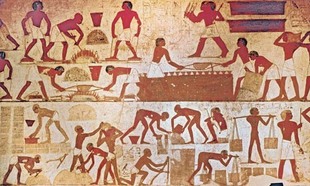
Although the grandeur of gods and kings in conflict will push the possibilities of our production technology, the EXODUS movie script has unfortunately exaggerated the human size of this biblical epic. That's right, not everything should be pushed to extreme proportions.
Does the Exodus story report disastrous numbers of flies, frogs, and locusts? Yes. Does the story have bloody rivers, a solar eclipse, and first-born Egyptians dying everywhere? Absolutely. Does the Exodus recount 400,000 slaves exiting Egypt into the Arabian Peninsula? Absolutely Not. Those numbers make no sense, and every Hebrew scholar knows it.
3 Million or 30,000 Semitic Slaves
Exodus 12:37-38 records the approximate number slaves who left Egypt during the Exodus. English translations say: "600,000 men journeyed on foot, aside from all the children and a mixed multitude of people with livestock." Since the reference to 600,000 men leaves out women, children, and under further investigation, men who were not able to fight, the estimated number of slaves leaving Egypt soars to 2 or 3 million people. Think about that. If you put 3 million people in a tight single file line, we are talking about a 568-mile long line. Yeah. That's ridiculous. It would actually account for half the population of Jews in modern-day Israel!
When we look at the total population of Egypt in the New Kingdom era (when Moses would have been floating down the Nile), 3 million is our best estimate for the entire population of Egypt, maybe 4 max. So what gives? The slaves would have been telling Pharaoh what to do if they were 3 million strong.
Deuteronomy 7:7 says Israel was a tiny group of people compared to other nations. Read it: “The Lord did not set His love on you nor choose you because you were more in number than any of the peoples, for you were the fewest of all peoples." That does not fit. 3 million people with 600,000 men fit for fighting would actually be the largest army in the ancient world by a factor of almost 10 (compared to 60,000 men in the coalition army of twelve kings from Palestine-Syria who fought the Assyrians according to the Annals of Shalmaneser III)! Deuteronomy 20:1 gives Israel explicit instruction for “when you go out to battle against your enemies and see horses and chariots and people more numerous than you.” Those would be unnecessary instructions if Israel had 600,000 fighting men. No army would ever be "more numerous."
So how do we make sense out of this?
600,000 Men or 600 Military Divisions?
The number 600,000 isn't what you think it is. Don't worry. I'm not about to make up spiritual meanings for numbers. In Hebrew, the expression translated "600,000" is actually the combination of the word "600" and the word "eleph." So the real question is: what is an eleph?
- A general reference to one thousand units of any number of objects such as chariots, horsemen, shekels, people, sheep, or goats (1 Sam 13:15; 17:5; 23:23; 25:2)
- A general reference to a thousand soldiers in a military context (1 Sam 4:2, 10; 6:19; 13:2; 15:4; 18:7-8; 21:11; 24:2; 26:2; 29:2, 5)
- A particular reference to a military company or unit (1 Sam 8:12; 17:18; 18:13; 22:7)
- A particular clan or extended family unit that exists as a sub-group within tribes (Judges 6:15; 1 Sam 10:19)
If meanings #1 or #2 are meant in Exodus 12:37, then we should keep reading 600,000 men or 2 to 3 million people left Egypt. However, if meanings #3 or #4 are meant, then 600 family or military units left Egypt along with children and a crowd of folks with livestock.
The distinct reference to 600 units of men in Exodus 12:37 and then a mixed multitude with livestock in Exodus 12:38 suggests the 600 units are male military divisions distinct from the general population. In this scenario, each military unit represents about 10 men from extended families in each tribe. The total number of slaves would be about 6,000 fighting men and roughly 12,000 to 24,000 women, children, and others. That brings the 3 million slaves way down to a realistic 20,000-30,000 people. So which one is right?
A Big Lesson from a Small Town
In Joshua 8:3-4, Joshua picks out "30,000 men" for his second ambush of a small town called Ai (pronounce it however you want). The town of Ai likely had less than 1,000 inhabitants (since the Bible considers it smaller than Jericho). Joshua 7:3 plainly acknowledges Ai only had a "few" people in it.
If Joshua actually sent "30,000 men" to attack the city, it would be one of the largest armies ever assembled up to that time and all just to conquer a small town. It makes no sense. Since the text explicitly describes Joshua's plan to "ambush" the city, 30,000 men would make it impossible to sneak up behind them. So how do we explain an unrealistic size of an army that could not practically ambush the small town as Joshua 8 recounts?
The answer is in meaning #3 above for eleph.
The Bible Background Commentary on the Old Testament explains it this way
"All of this suggests that the word translated “thousand” in these passages should be rendered by its alternate meaning, “companies” or “divisions.” Rather than a specified number, it has been suggested that each clan supplied a division with the number varying dependent on the size of the clan. Later in history these companies were standardized as having a thousand, but here there may be as few as ten in a division. In the first attack on Ai in 7:4–5 there were three “thousand” sent and they treated it as a massacre when thirty-six were killed. In the Amarna letters the kings of the city states would beg Egypt for ten or twelve soldiers to reinforce their armies."

There is no need to question the historical accuracy of the ancient Exodus because of gigantic numbers. 3 million Semites (or "Asiatics" as Egyptians called them) could not have lived in Egypt and then exited in the New Kingdom era. Archaeology demonstrates that plainly. However, we have discovered remains of Semite settlements in Egypt suitable to a more accurately interpreted version of the Exodus. The best scholarly book about Israel's ancestors in Egypt is James Hoffmeier's Israel in Egypt (disclaimer: I studied in Egypt under this guy. Brilliant!). He gets you into the details rather than taking broad strokes with debatable assumptions (as Peter Enns does in his latest book The Bible Tells Me So when he dismisses the accuracy of the biblical Exodus because archaeology hasn't found traces of 2 million slaves in Egypt or wandering the Sinai desert. C'mon Peter, you're smarter than elongated arguments rooted in bad assumptions!)
I'm not sure where the EXODUS movie got 400,000 slaves, but it didn't come from a careful analysis of the Hebrew Bible. Reading 600,000 men and 2-3 million total slaves doesn't either. This is why knowing Hebrew matters (sorry to those still believing: the Holy Spirit + an English Bible = everything you need to guide you into all truth). The Bible's message is too important to run with details that don't match the meaning in the original language of its writers.
But some of you astute readers may wonder: doesn't the Bible say the exact number of fighting men added up to 603,550? I'm impressed. Not everyone has read the books of Exodus and especially Numbers with such care. Exodus 38:26 and Numbers 1:46; 2:32 all conclude the exact number of fighting men is 603,550. Why? Because Moses counted them in the Sinai wilderness.
Moses's census (preserved in Numbers 1 and 2) listed the population of each tribe's fighting men in 3 categories (see Numbers 1:18):
- by tribe
- by family
- by the exact number of men
The Bible Background Commentary on the Old Testament explains how 598 units of 5,500 men got turned into 603,000 guys:
"The total in verse 32 would originally have been written 598 military divisions (‘lp), [totaling] 5 thousand (‘lp) and 5 hundred men. But at some point in the transmission of the text the two words were confused and added together to make 603 thousand."
I hope Ridley Scott's EXODUS movie makes us all tremble at this redemptive epic of biblical proportions. But don't buy into the historical confusion around misinterpreted numbers. You may not like some of the added dialogue or extra-biblical scenes, but the real problem to avoid is making the Bible unrealistic because you misunderstood it in the first place.
The Bible isn't a simple book for everyone to understand once it is translated into their native language (sorry to bust up the "God, translated Bible, and poof I hear from God perfectly" theory). It takes careful research and honed skill to understand the details. I hope you feel better prepared to read the Exodus epic and take in the movie if you so choose. Let me know if you have questions about the historical accuracy of any other story elements.







 RSS Feed
RSS Feed
